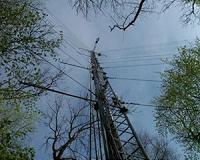 |
Palo Alto CA (SPX) Jul 07, 2010 With carbon dioxide in the atmosphere approaching alarming levels, even halting emissions altogether may not be enough to avert catastrophic climate change. Could scrubbing carbon dioxide from the air be a viable solution? A new study by scientists at the Carnegie Institution suggests that while removing excess carbon dioxide would cool the planet, complexities of the carbon cycle would limit the effectiveness of a one-time effort. To keep carbon dioxide at low levels would require a long-term commitment spanning decades or even centuries. Previous studies have shown that reducing carbon dioxide emissions to zero would not lead to appreciable cooling, because carbon dioxide already within the atmosphere would continue to trap heat. For cooling to occur, greenhouse gas concentrations would need to be reduced. "We wanted to see what the response would be if carbon dioxide were actively removed from the atmosphere," says study coauthor Ken Caldeira of Carnegie's Department of Global Ecology. "Our study is the first to look at how much carbon dioxide you would need to remove and for how long to keep atmospheric carbon dioxide concentrations low. This has obvious implications for the public and for policy makers as we weigh the costs and benefits of different ways of mitigating climate change." For the study, Caldeira and lead author Long Cao, also at Carnegie, did not focus on any specific method of capturing and storing carbon dioxide from the ambient air. The possibilities include approaches as diverse as industrial-scale chemical technologies and changing land use so more carbon dioxide is naturally absorbed by vegetation. For the study, the researchers used an Earth system model under projected conditions at the middle of this century when global surface temperatures have been raised 2 degrees C (3.6 degrees F). They then simulated the effects of an idealized case in which carbon emissions were reduced to zero and carbon dioxide in the atmosphere was instantaneously restored to pre-industrial levels. The researchers found that removing all human-emitted carbon dioxide from the atmosphere caused temperatures to drop, but it offset less than half of CO2-induced warming. Why would removing all the extra carbon dioxide have such a small effect? The researchers point to two primary reasons. First, slightly more than half of the carbon dioxide emitted by fossil-fuels over the past two centuries has been absorbed in the oceans, rather than staying in the atmosphere. When carbon dioxide is removed from the atmosphere, it is partially replaced by gas coming out of ocean water. Second, the rapid drop in atmospheric carbon dioxide and the change in surface temperature alters the balance of the land carbon cycle, causing the emission of carbon dioxide from the soil to exceed its uptake by plants. As a result, carbon dioxide is released back into the atmosphere. According to the simulations, for every 100 billion tons of carbon removed from the atmosphere, average global temperatures would drop 0.16 degrees C (0.28 degrees F). Further simulations showed that in order to keep carbon dioxide at low levels, the process of extracting carbon dioxide from the air would have to continue for many decades, and perhaps centuries, after emissions were halted. "If we do someday decide that we need to remove carbon dioxide from the atmosphere to avoid a climate crisis, we might find ourselves committed to carbon dioxide removal for a long, long time. A more prudent plan might involve preventing carbon dioxide emissions now rather than trying to clean up the atmosphere later."
Share This Article With Planet Earth
Related Links Carnegie Institution The Air We Breathe at TerraDaily.com
 Cycling Carbon Through Terrestrial Ecosystems
Cycling Carbon Through Terrestrial EcosystemsWashington DC (SPX) Jul 07, 2010 Two recent international studies are poised to change the way scientists view the crucial relationship between Earth's climate and the carbon cycle. These reports explore the global photosynthesis and respiration rates-the planet's deep "breaths" of carbon dioxide, in and out-and researchers say that the new findings will be used to update and improve upon traditional models that couple to ... read more |
|
| The content herein, unless otherwise known to be public domain, are Copyright 1995-2010 - SpaceDaily. AFP and UPI Wire Stories are copyright Agence France-Presse and United Press International. ESA Portal Reports are copyright European Space Agency. All NASA sourced material is public domain. Additional copyrights may apply in whole or part to other bona fide parties. Advertising does not imply endorsement,agreement or approval of any opinions, statements or information provided by SpaceDaily on any Web page published or hosted by SpaceDaily. Privacy Statement |